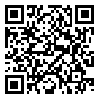Volume 25, Issue 3 (2021)
CLR 2021, 25(3): 1-21 |
Back to browse issues page
Download citation:
BibTeX | RIS | EndNote | Medlars | ProCite | Reference Manager | RefWorks
Send citation to:



BibTeX | RIS | EndNote | Medlars | ProCite | Reference Manager | RefWorks
Send citation to:
Abhary H, pakzad M, Mehdipour M. The concept and effect of reluctance in civil liability in Iranian and French law. CLR 2021; 25 (3) :1-21
URL: http://clr.modares.ac.ir/article-20-51879-en.html
URL: http://clr.modares.ac.ir/article-20-51879-en.html
1- Professor of Private Law in Mazandaran University, Babolsar, Iran
2- PhD Student in Private Law, Mazandaran University, Babolsar, Iran ,pakzadlaw64@gmail.com
3- Assistant Professor of Law, Ilam Azad University, Ilam, Iran
2- PhD Student in Private Law, Mazandaran University, Babolsar, Iran ,
3- Assistant Professor of Law, Ilam Azad University, Ilam, Iran
Abstract: (2533 Views)
Man is a voluntary being, and having this quality causes human responsibilities to be borne And if a person is reluctantly influenced by her will, it is not possible to hold her responsible to some extent. Of course, this view is foreseen in the discussion of the general rules of contracts and criminal liability in the laws of Iran and France, but the Iranian legislator has been silent on civil liability law. Scholars of Islamic sciences have addressed this issue in jurisprudential books and disagree on some issues, including the issue of reluctant murder. The Islamic Penal Code legislates the punishment of the reluctant person, but in the legal field, Iranian jurists, in their books on civil liability, briefly refer to the books of jurisprudence and related laws, but a special rule for It has not been predicted. Carefully in the laws of Iran and France, the need to provide separate materials for the issue of reluctance in civil liability of Iran due to the growing importance of civil liability and to prevent disagreement in the judicial process has been felt and the proposed materials have been presented.
Article Type: Original Research |
Subject:
Comparative Law
Received: 2021/04/22 | Accepted: 2021/12/4 | Published: 2022/03/1
Received: 2021/04/22 | Accepted: 2021/12/4 | Published: 2022/03/1
Send email to the article author
| Rights and permissions | |
 |
This work is licensed under a Creative Commons Attribution-NonCommercial 4.0 International License. |







